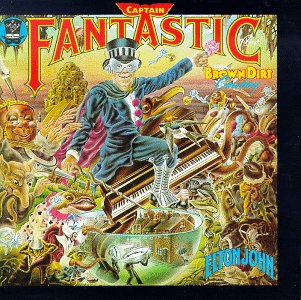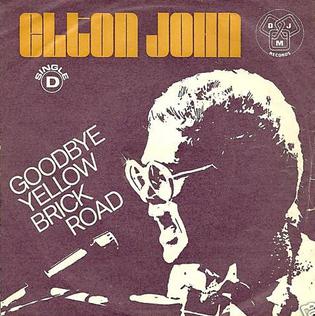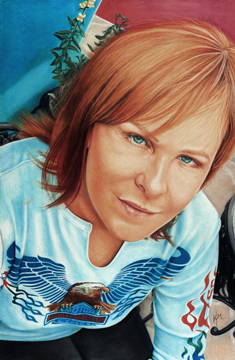
Bernard John Taupin is an English-American lyricist and visual artist. He is most well known for his songwriting partnership with Elton John, recognised as one of the most successful partnerships of its kind in history. Taupin is behind the majority of John's songs, dating back to the 1960s.

Goodbye Yellow Brick Road is the seventh studio album by English singer, pianist, and composer Elton John, first released on 5 October 1973 as a double album by DJM Records. The album has sold more than 20 million copies worldwide and is widely regarded as John's magnum opus. Among the 17 tracks, the album contains the hits "Candle in the Wind," US number-one single "Bennie and the Jets," "Goodbye Yellow Brick Road" and "Saturday Night's Alright for Fighting", along with the live favourite "Funeral for a Friend/Love Lies Bleeding."

Captain Fantastic and the Brown Dirt Cowboy is the ninth studio album by English musician Elton John. The album is an autobiographical account of the early musical careers of Elton John and his long-term lyricist Bernie Taupin. It was released in May 1975 by MCA Records in America and DJM in the UK and was an instant commercial success. The album was certified gold before its release, and reached No. 1 in its first week of release on the US Billboard 200, the first album to achieve both honours. It sold 1.4 million copies within four days of release, and stayed in the top position in the chart for seven weeks.

"Candle in the Wind" is a threnody written by English musician Elton John and songwriter Bernie Taupin, and performed by John. It was originally written in 1973, in honour of Marilyn Monroe, who had died 11 years earlier.

David Hentschel is an English recording engineer, film score composer and music producer who engineered on George Harrison's All Things Must Pass and Elton John's Goodbye Yellow Brick Road, as well as for such artists as Genesis, Tony Banks, Ringo Starr, Queen, Nazareth, Marti Webb, Andy Summers, Mike Oldfield, Renaissance, Peter Hammill and Ronnie Caryl.

Elton John One Night Only – The Greatest Hits is a live album released by English musician Elton John in 2000. The album was recorded on 20 and 21 October 2000 at Madison Square Garden. An extended version was also released as a DVD, entitled One Night Only: The Greatest Hits Live at Madison Square Garden. While the album is called "One Night Only," it was in fact recorded over two nights. Due to technical issues on the first night, most of the recordings were drawn from the second show. In the US, it was certified gold in July 2001 by the RIAA.

"Goodbye Yellow Brick Road" is a ballad written by English musician Elton John and songwriter Bernie Taupin, and performed by John. It is the title track on John's album of the same name. The titular road is a reference to L. Frank Baum's The Wizard of Oz film and book series.

"Saturday Night's Alright for Fighting" (sometimes written "Saturday Night's Alright (For Fighting)") is a song originally recorded by English musician Elton John. John composed it with his long-time songwriting partner Bernie Taupin. It was released on John's best-selling album Goodbye Yellow Brick Road (1973) and as the first single. It has been covered by many artists and featured on motion picture, video game, and television soundtracks.

"Bennie and the Jets" is a song written by English musician Elton John and songwriter Bernie Taupin, and performed by John. The song first appeared on the Goodbye Yellow Brick Road album in 1973. "Bennie and the Jets" has been one of John's most popular songs and was performed during his appearance at Live Aid.

Elton 60 – Live at Madison Square Garden is a 2-disc DVD release, starring Elton John performing some of his biggest hits and several fan favourites. The release features appearances by comedians Robin Williams and Whoopi Goldberg, as well as special remarks to the audience by lyricist Bernie Taupin. The concert was recorded on John's 60th birthday, 25 March 2007, and coincides with his record-setting 60th concert at Madison Square Garden in New York City.
Riding on the success of their previous two tours, Elton John and Billy Joel once again hit the stadiums in 1998. The production had previously only toured the United States and Canada, but this time they visited Australia, New Zealand, Japan, and Europe, avoiding any North American cities.
The Jump Up! Tour was a worldwide concert tour by English musician and composer Elton John, in support of his 16th studio album Jump Up!. The tour included five legs and a total of 135 shows.
"Teacher I Need You" is a song written by English musician Elton John and songwriter Bernie Taupin, and performed by John. It was first released on John's 1973 album Don't Shoot Me I'm Only the Piano Player. The lyrics tell of a schoolboy's crush on his teacher, and the music evokes the sound of 1950s songs.

"Elderberry Wine" is a song written by English musician Elton John and songwriter Bernie Taupin, and performed by John. It was first released on John's 1973 album Don't Shoot Me I'm Only the Piano Player. It was also released as the B-side of John's No. 1 hit "Crocodile Rock" in October 1972. It was also popular on album-oriented rock radio stations. John played it live during his 1973 tour. It was covered by Irish-Scots singer Mae McKenna.
The Diving Board Tour was a concert tour by British musician Elton John taking place in North, South and Central America and Europe in promotion of John's 2013 album The Diving Board.

"Harmony" is a song written by English musician Elton John and songwriter Bernie Taupin, and performed by John. It is the final song on the 1973 double album Goodbye Yellow Brick Road. The song was recorded in May 1973, at Château d'Hérouville, France.

Maxine Feibelman is a former seamstress for California bands who was married for several years to Elton John's frequent collaborator Bernie Taupin. Her romance, marriage, and break-up with Taupin influenced some of Taupin's and John's songs, she provided the title and refrain for one of their songs, and she supported John's path toward his distinct stage costume style.

Revamp: Reimagining the Songs of Elton John & Bernie Taupin and Restoration: Reimagining the Songs of Elton John and Bernie Taupin are two tribute albums to English musician Elton John and his frequent songwriting partner Bernie Taupin, both released on 6 April 2018. Revamp was described as John's project and features covers of the duo's back catalogue by pop, rock and R&B artists, whereas Restoration was seen as Taupin's project and features covers by country music artists. Revamp was released via Island Records and Restoration by Universal Music Group Nashville. The release of the albums coincided with John's 2018–2023 Farewell Yellow Brick Road tour.

Live from Moscow 1979 is a live album by English musician Elton John released in April 2019. It was recorded during John's May 1979 tour of the Soviet Union, when he played a series of shows in Leningrad and Moscow accompanied by percussionist Ray Cooper. The live recordings were initially broadcast by BBC Radio 1 and were long available on bootleg albums. Footage was also included in the 1979 documentary To Russia...With Elton. The official release, as a limited-edition double LP, was issued for Record Store Day 2019 to celebrate the 40th anniversary of the tour. The album was then re-released in 2020 on vinyl and CD, and in digital music stores.
"We All Fall in Love Sometimes" is the ninth track on Elton John's album Captain Fantastic and the Brown Dirt Cowboy, written by John (music) and Bernie Taupin (lyrics), and released in 1975.















